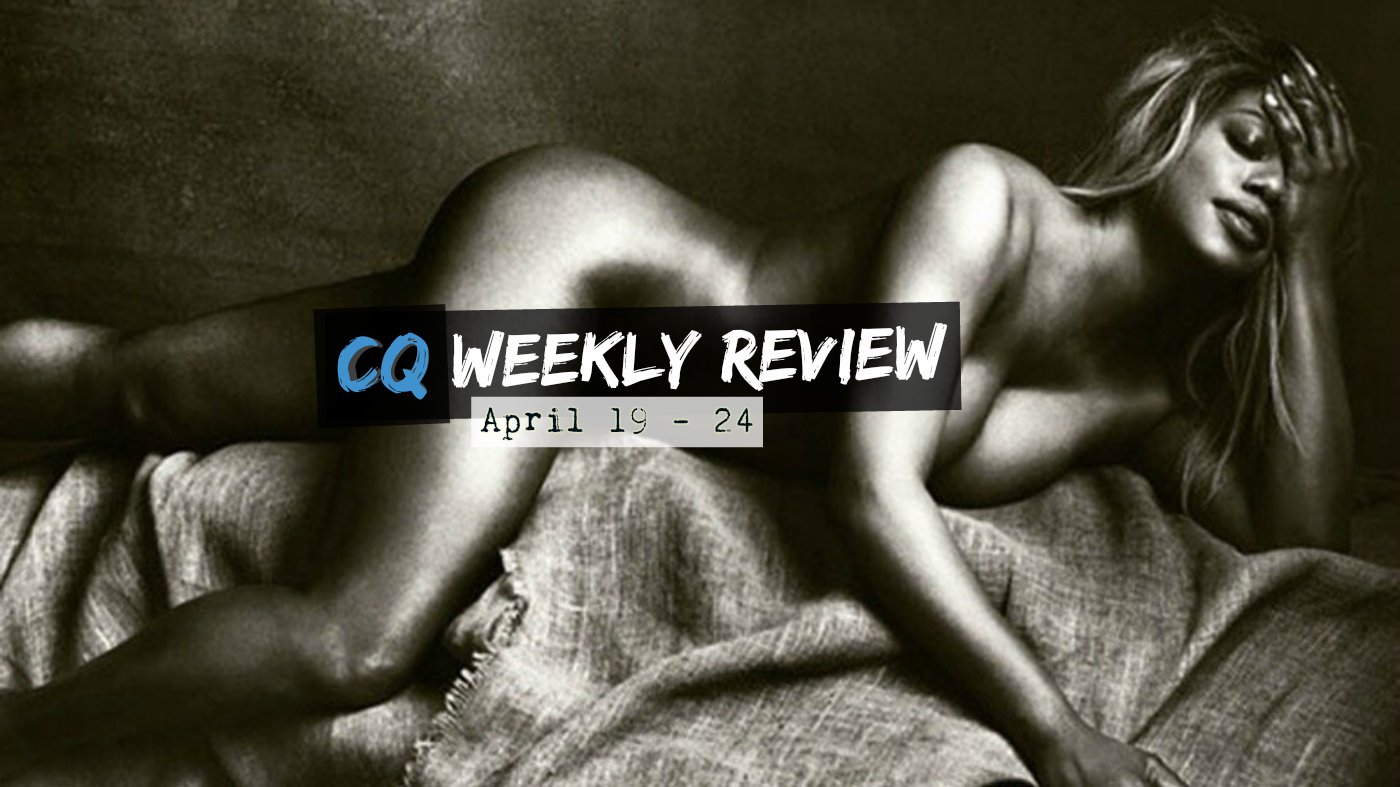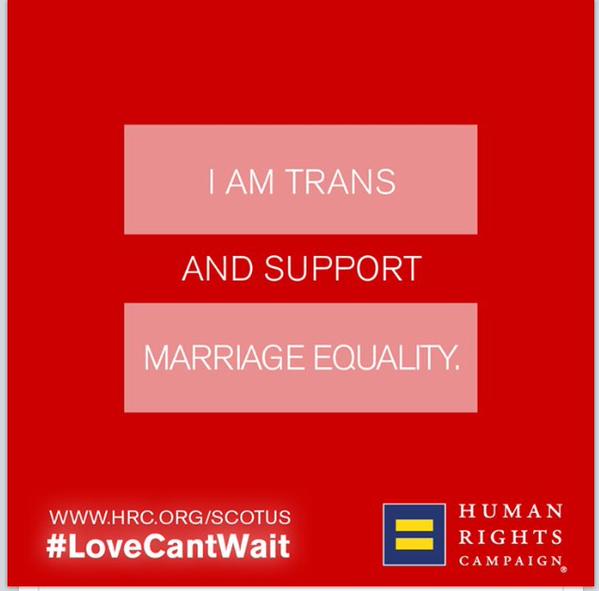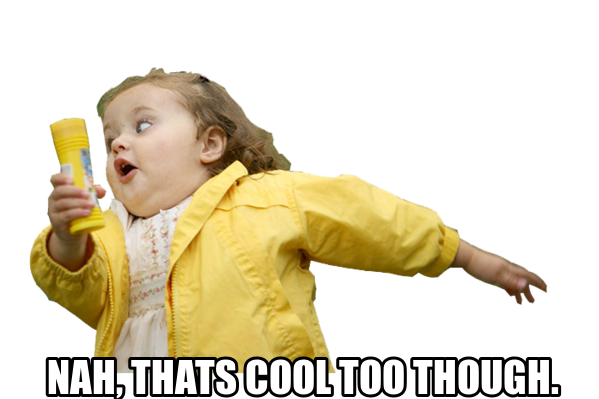Category: Digital Citizen

On Lowering “Misogynoiristic Expectancy” from a Gay Black Man’s Standpoint
In light of his phenomenal piece on Model View Culture, in which he broke down the ways in which online interactions almost always ends badly for the Black women and femmes involved due to the realities of hypervisibility and a plain ole “Open Season” that never seems to truly end (among other factors), I sit in awe of Riley H. and wonder what I can do to chill the f**k out and back the f**k up with regards to my online interactions with Black femme folk. Read More

CQ Weekly Review (April 19-24)
So, how has this week been for the Contemporary Queer?
For Real HRC? For Real, For Real?
So yeah… Found this on Twitter.
Really, HRC? #LoveCantWait but trans people can take a number? Y’all just gonna… But I had thought…. But y’all had said… I thought we was gonna… Here’s why this is a slap in the face to trans people. Again. Or is it a constant slap that never really ended despite promising to do better?
Youth Empowerment Conference (Boston/NE)
The Hispanic-Black Gay Coalition is getting ready for it’s annual Youth Empowerment Conference and is inviting you to present in what it calls “currently the largest conference gathering of LGBTQ youth of color and their allies in New England”. So if you plan to be around, why don’t you share your knowledge and skills with these awesome and deserving kids? Here’s the signup sheet!
Perspective on Black Gay Privilege
Tabias Wilson complicated Black Gay Male “Privilege” in Gawker this week, breaking down a piece published earlier by John Fitzgerald Gates about the same topic. In his piece, Tabias went in on what that the “privilege” entailed and offered us a glimpse into his life to demonstrate the high price black queer men paid for the so-called “privilege”:
Walking into the office felt like I was on the auction block. I was clothed and free-ish—but my socioeconomic future depended on the presentation of my blackness, the (imagined) invitation of my queerness, and her unfettered, unregulated, and unencumbered access to it. This was the price I paid in order to work on an issue vital to the survival of my people, black people, BlaQueer people. In order to pitch policies, garner grants, and direct funding to black HIV survivors and those at-risk for acquisition, I had to mortgage my body and use the proceeds as license to work on a leash. …Read More>>
American Vogue’s First Openly Trans Model
https://instagram.com/p/1Bwd8mMNvl/?taken-by=andrejapejic
Finally! 23 year old model Andreja Pejic is the first transgender model to be featured in American Vogue.
“If at the beginning of my career in the modelling industry or half way through it or even this time last year you told me that I would end up having a 4 page feature in American Vogue I would have probably told you ‘oh I dunno about that… So you can only imagine what I’m feeling right now,” wrote the 23-year-old transgender model on an Instagram post to announce her breakthrough appearance on the magazine. …Read More>>
Laverne Cox Subverts the Gaze
Actress and activist Laverne Cox slayed in her empowering nude photoshoot with Allure Magazine! In Laverne’s own words:
“But I’m a black transgender woman. I felt this could be really powerful for the communities that I represent. Black women are not often told that we’re beautiful unless we align with certain standards. Trans women certainly are not told we’re beautiful. Seeing a black transgender woman embracing and loving everything about herself might be inspiring to some other folks. There’s beauty in the things we think are imperfect. That sounds very cliché, but it’s true. …Read More>>
Your Take
So what’s your take in the news presented this week? Good news? Bad news? Got something we missed? Let us know in the comments below!
Got any news you wanna see here next week? Tweet us at @ConQueerMag (use our sidebar too!)

How to Start a Blog
There’s no reason you can’t make your own these days. If you want a platform to express yourself, to give your takes on important topics, or provide a space for others, you have the ability to do just that. You can do podcasts, you can vlog–anything.
If you’re here, I’d imagine you were looking to start a blog because someone said “well if you don’t like it, make your own” and you were all like “well maybe I will” and so you set out to do so but you wanted some queer intersectional sauce up in your startup. We got you, boo.
We gotchu.
In this post, we will go into the “program” aspects of creating a blog and not so much of the technical aspects.
1. Theme & Purpose
So why are you starting a blog? Are you doing it so you can build up your writing experience? Draw in readers from a particular community and become an authority voice? Just want to be one of the cool kids? Or even make a space that can be a conduit for other voices?
Your purpose is important because then you’ll have a driving force behind your platform. It’s like the mission statement to a business: What are you serving and why?
For example, Contemporary Queer has a mission to bring relevant topics and nuggets of thought to queer Millennials while empowering them to be agents in their own destinies. Everything we do here is meant to reflect that.
If you were to make a blog, what would it center around and how would you drive that theme forward? Is there a group already into what you’re thinking that could lend a hand or an ear? Could you do it without getting bored for a long time or would you have to develop discipline like none other just to create a few weeks worth of content?
2. Audience
Audience is very important. And it’s important that you be genuine or else you’ll be seen through immediately. Why? People prefer authenticity.
When you are authentic, there’s just something that other people (especially other people in your community or group) can recognize and identify with. There’s an air of “walk the walk” that, when you fake it, doesn’t go very far. So why is that important for audience?
If you want loyal readers (especially from a community based on the same interests and way of life) you have to speak to them in the same language and tone they use with each other (if appropriate). You’ll have to speak to them in the tone they want to hear what you have to say in and it’s easier when you’re not speaking at them, but to them or with them.
And even if you aren’t writing for a community, having one in mind may help your writing direction. More on that in the next topic…
3. Community (or Nah?)
So while I just waned poetic about the necessity of speaking to folks in their language, that’s kind of dependent on a few things. Like–are you trying to appeal to a community/specific type of person? Conventional wisdom holds that when you communicate it is likely to another person/group, but it could very well be that you’re just throwing blog stuff at a wall and seeing what sticks.
But even if you do decide to write without a community in mind, you’ll still want to keep your blog’s tone consistent. This way people can know what to expect from you, and if they appreciate your content (while perhaps not being a part of the community you’re writing for/writing for “theoretically”) they’ll come back often.
But aside from writing/content, it also comes down to this: Are you allowing yourself to be beholden/accountable to a specific group of people? When you write for a community, you embed yourself into the community and its members will accept, tolerate, or reject you. Likewise, you begin to customize your writing based on the specific issues affecting them at any given moment in time.
If you choose not to be a part of a community but still write content that concerns them or on behalf of them, you are more free to write however and whatever you choose, but it will be your content that gets praise/shared when it is good and you personally who gets dragged/called out if it is insulting.
When we want to praise, we uphold the words. When we want to drag, we look for the @.
~Sage Nenyue, “Yes, I Quoted Myself” Vol. 3
In my case, I’ve been “in the community” since I was 15, in the sense that I have always looked at things equality-wise and used my writing to serve my understanding of justice and liberation. So personally, if I’m going to blog about LGBTQ stuff, I’d rather write for the community as a part of that community.
4. Reward
If you love creating, there’s reward in blogging for the sake of blogging. You can do you for you and can’t nobody but you hold you back. There might also be other reasons you blog which I break down into “glory”, “impact”, and “gain”.
A. Glory
Glory refers to the social capital you want to build or your own personal brand. When people hear your name and they think of how you brought them a smile or how you always liven up their days, that’s glory. The positive in this one comes off as two-fold, because if you’re looking for glory and you try too hard, it will show. People will clock you quickly. On the flip side, if you’re humble (or at the very least have a good humility mask on), people will speak highly of you and your refined dignity and creations.
B. Impact
Blogging with impact as the focus mostly takes you out of the equation and makes you the byline with the message as the most important part. While you don’t have to be as stiff as a news blog, your writing will come off as informative and heart-touching without all of you and your feel-feels getting in the way. It will feel neutral/natural and the reader will be able to see themselves in your creation. And if it’s great content (and you protect yourself against being plagiarized or cut out of the credit), you’ll find yourself with relative glory and gain in time while belting out Bey’s “I Was Here”.
B. Gain
When you blog for gain, you do so with the intent of making money or getting presents from brands that you can deliver the eyes of your audience to. Instagram and Youtube bloggers are the first ones that spring to mind when creating that visual lifestyle of ostentation. It’s not wrong or bad–everybody needs to make a buck under capitalism–but blogging for gain is associated with ugly things for those who can spot it: Shoddy content, unnatural writing (SEO), quantity over quality, shallow community relations (if any). It makes the readers feel cheated, especially if they aren’t getting any value in return.
So if you blog for gain, either make quality content that readers enjoy and can identify with, or make it worth their while to be associated with you.
In the spirit of full disclosure: You might notice some ads on Contemporary Queer. Well, until we get funding from a rich daddy or mama that’s tryna pay our bills but not expecting us to compromise our message or audience, Google is one of the few low-cost investments I know to make money to be able to pay writers and develop programs in the future.
Conclusion
These are some things to consider when starting a blogging platform and it’s only the tip of the iceberg. I share these because I want to see more spaces that prioritize us flourish and thrive. Do you know how it broke my heart when I couldn’t find a compact trans take on “Trans Day of Visibility” in time for the Five Queer Holidays post and had to use the MSNBC storify? Nothing against major mainstream news networks, but I am more interested in empowering our folks first and foremost.
If you have tips to add, leave a comment and we’ll share them on Twitter. If you are interested in writing for Contemporary Queer, here’s how!

